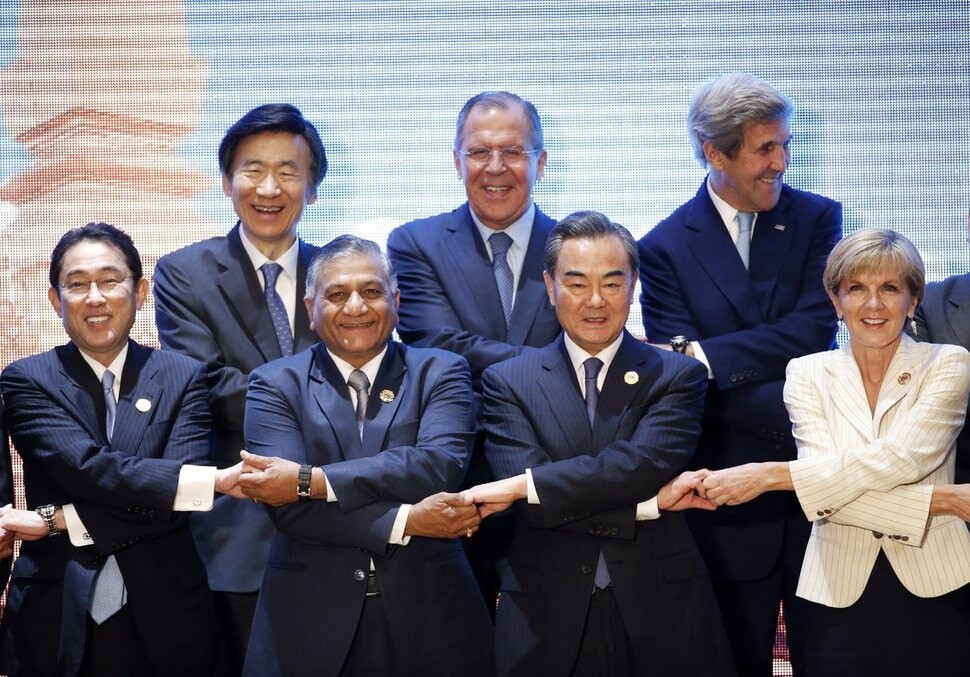hankyoreh
Links to other country sites 다른 나라 사이트 링크
ASEAN statement expresses concern for Korean peninsula situation

A chairman’s statement was adopted on July 27 for a meeting of foreign ministers at the 23rd ASEAN Regional Forum. Its adoption one day after the meeting’s close came despite some predictions of difficulties reaching an agreement on the content. As with last year’s statement, the text included wording about the North Korean nuclear program, but none regarding the current controversy over plans to deploy a Terminal High Altitude Area Defense (THAAD) system with US Forces Korea.
References to the North Korean nuclear issue and other Korean Peninsula-related matters accounted for four sentences of the 24th clause in the statement.
“The Ministers expressed concerns over the recent developments on the Korean Peninsula, including the nuclear test [on Jan. 6] and launches using ballistic missile technology [on Feb. 7 and July 9] by the Democratic People’s Republic of Korea (DPRK), which are in violation of the relevant United Nations Security Council (UNSC) resolutions,” the statement read.
“The Ministers also highlighted . . . the need to fully comply with all relevant UNSC resolutions, including UNSC resolution 2270,” it continued.
“The Meeting underlined the importance of creating necessary conditions for the early resumption of the Six-Party Talks, which would help pave the way toward peaceful denuclearisation of the Korean Peninsula,” it added.
On the statement’s wording on the North Korean nuclear issue, a senior South Korean government official said, “We feel it is very good wording that reflects all the items we sought to include.”
Meanwhile, the absence of any reference to a July 12 ruling by the Permanent Court of Arbitration (PCA) invalidating China’s territorial claims in the South China Sea - one of the major issues at the meeting - suggests Beijing managed to more or less successfully fend off a series of attacks by the US and Japan. Indeed, this year’s statement did not include the same wording on the issue as last year’s, which made reference to resolving difference “in accordance with international law.” The change appears to reflect the wishes of Beijing, which has called for voiding of the PCA ruling. This would mean a victory for China in the current diplomatic battle over its South China Sea dispute.
By Lee Je-hun, staff reporter in Vientiane
Please direct questions or comments to [english@hani.co.kr]

Editorial・opinion
![[Column] Has Korea, too, crossed the Rubicon on China? [Column] Has Korea, too, crossed the Rubicon on China?](https://flexible.img.hani.co.kr/flexible/normal/500/300/imgdb/original/2024/0419/9317135153409185.jpg) [Column] Has Korea, too, crossed the Rubicon on China?
[Column] Has Korea, too, crossed the Rubicon on China?![[Correspondent’s column] In Japan’s alliance with US, echoes of its past alliances with UK [Correspondent’s column] In Japan’s alliance with US, echoes of its past alliances with UK](https://flexible.img.hani.co.kr/flexible/normal/500/300/imgdb/original/2024/0419/2317135166563519.jpg) [Correspondent’s column] In Japan’s alliance with US, echoes of its past alliances with UK
[Correspondent’s column] In Japan’s alliance with US, echoes of its past alliances with UK- [Editorial] Does Yoon think the Korean public is wrong?
- [Editorial] As it bolsters its alliance with US, Japan must be accountable for past
- [Guest essay] Amending the Constitution is Yoon’s key to leaving office in public’s good graces
- [Editorial] 10 years on, lessons of Sewol tragedy must never be forgotten
- [Column] A death blow to Korea’s prosecutor politics
- [Correspondent’s column] The US and the end of Japanese pacifism
- [Guest essay] How Korea turned its trainee doctors into monsters
- [Guest essay] As someone who helped forge Seoul-Moscow ties, their status today troubles me
Most viewed articles
- 1[Column] The clock is ticking for Korea’s first lady
- 2After 2 months of delayed, denied medical care, Koreans worry worst may be yet to come
- 3[Column] Has Korea, too, crossed the Rubicon on China?
- 4[Editorial] When the choice is kids or career, Korea will never overcome birth rate woes
- 5[Correspondent’s column] In Japan’s alliance with US, echoes of its past alliances with UK
- 6Hong Se-hwa, voice for tolerance whose memoir of exile touched a chord, dies at 76
- 7US exploring options for monitoring N. Korean sanctions beyond UN, says envoy
- 8Samsung barricades office as unionized workers strike for better conditions
- 9US overtakes China as Korea’s top export market, prompting trade sanction jitters
- 10[Photo] Smile ambassador, you’re on camera